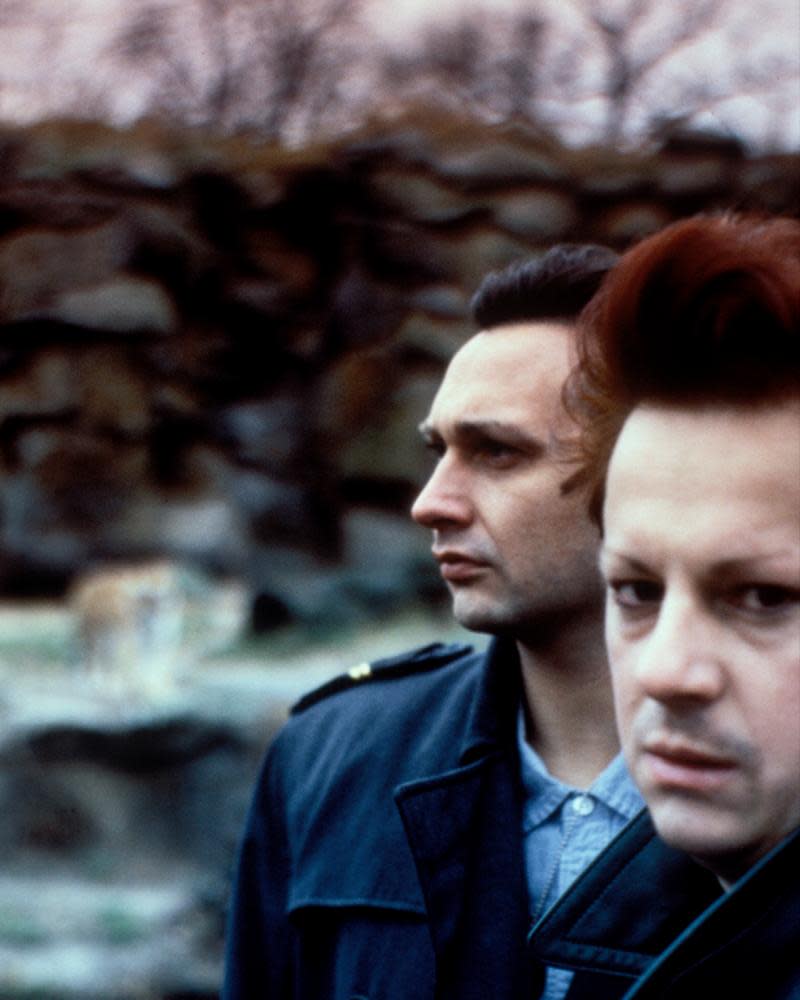Richard H Kirk obituary
Richard H Kirk, who has died aged 65, was a key figure in the development of British electronic and DIY music, from his co-founding of the Sheffield-based band Cabaret Voltaire in the 1970s, through his 90s recordings for Warp Records, and to his later solo work fusing electronics, funk and dub.
Cabaret Voltaire, formed in 1973 by Kirk, Chris Watson and Stephen Mallinder, predated the famous “steel city” electronic scene that included the Human League, Vice Versa (later ABC) and Heaven 17, and impacted on Pulp and Moloko’s hits years later.
While early tracks such as Do the Mussolini (Headkick) (1978), Baader-Meinhof (1979) and the indie hit single Nag Nag Nag (1979) were abrasively provocative, their output became funkier and began to infiltrate edgier clubland dance floors. After Kirk’s releases (with Richard Barratt) as Sweet Exorcist defined the Warp “bleep” sound, he subsequently amassed a gargantuan solo catalogue under his own name and aliases such as Sandoz, Electronic Eye, Dark Magus and Frightgod, and his influence stretches into techno, electronica, hardcore, jungle and dubstep.
As a teenage Roxy Music fan, Kirk was inspired by Brian Eno’s declaration that you did not need to be a musician to make music. Thus, also influenced by William Burroughs’ and Brion Gysin’s “cut-up” methods, Cabaret Voltaire (the name coming from the first world war-era Zurich club of the similarly minded dada scene) made music using found sounds – everything from manipulated noise to snatches of radio broadcasts – years before the sampler made such techniques commonplace. Their mix of abrasive vocals, tape loops and (initial) mix of live instrumentation with electronics created a blueprint for industrial music.
Fans ranged from electronic music stalwarts Kraftwerk, Depeche Mode and New Order, the latter making their first recordings at Cabaret Voltaire’s Western Works studio in Sheffield, the Canadian industrial music band Skinny Puppy, and Chicago house music producer Frankie Knuckles. The producer and Big Black founder Steve Albini said that Cabaret Voltaire “formed my aesthetic and sense of self. They implied a new way of making music.”
Kirk, who lived in his native Sheffield all his life, shunned the limelight and kept his personal life private. Born in the city, he once said that his steel worker father, an amateur radio ham, fired his interests in electronics and, briefly, radical politics, taking him to Young Communist League meetings.

From the age of 13, Kirk and Mallinder would go to soul nights to listen to black American music. Kirk, who attended a one-year art school course in sculpture, began working with Watson, a GPO electronics engineer who played “tape recorder and oscillator”, in the latter’s attic. Initially Kirk played clarinet and guitar, and Mallinder joined them on bass and vocals to form Cabaret Voltaire. They borrowed a VCS3 synthesiser from Sheffield University’s music department before Watson built his own.
Although he lived within earshot of the steelworks, Kirk denied that Cabaret Voltaire’s music attempted to replicate the sounds of heavy industry, considering it their escape into an alternative reality. He said that because there was so little music in mid-70s Sheffield they invented their own, absorbing influences from the likes of the German experimental band Can and soul/funk stars James Brown and George Clinton.
Early performances proved controversial and confrontational, with local audiences confused by their challenging, esoteric sound. Their first gig, in May 1975 – after they had mischievously described themselves as a funk band to get booked for a Tuesday night disco – ended in a fight and put Mallinder in hospital. Even during punk, a performance supporting Buzzcocks at London’s Lyceum in March 1978 was cut short owing to flying glasses thrown by the angry crowd. Gradually, though, championed by DJs such as Radio Hallam’s Richard Tandy and Radio 1’s John Peel, their ideas prevailed. After signing to Rough Trade in 1978 and setting up Western Works in the former offices of the Sheffield Federation of Young Socialists, the band released their debut album, Mix-Up, the following year. Following the success of Nag Nag Nag, albums such as The Voice of America (1980) and Red Mecca (1981) also did well in the independent charts, the latter reaching No 1.
After Watson left in 1981, Cabaret Voltaire signed to Virgin, a major label that offered the sort of advance that enabled them to splash out on equipment. The Crackdown (1983) reached the Top 40 and lusher, clubbier tracks such as Just Fascination (1983) and Sensoria (1984) exerted their influence on the dancefloor. After a dispiriting spell with EMI, when they nevertheless worked with the producer Adrian Sherwood and the Chicago house DJ Marshall Jefferson, Cabaret Voltaire ceased in 1994, by which time Kirk was exploring possibilities in dance music.
Sweet Exorcist’s 1990 singles Testone and Clonk, on Warp, were among the Sheffield electronic label’s first releases, and their album CCEP/CCCD was the label’s first LP release, in 1991. Kirk subsequently recorded a vast array of releases under different names. Chris Carter and Cosey Fanni Tutti of industrial music pioneers Throbbing Gristle reported that Kirk had once given them a bag of “absolutely brilliant dance tracks”, which all turned out to be by him.
In 2009, having turned down “a very fucking large amount of money” from Coachella festival to re-form Cabaret Voltaire, Kirk typically perversely reactivated the name for some live solo performances, but refused to play old songs, insisting audiences “might get the same spirit”.
In 2020, he released Shadow of Fear, the first Cabaret Voltaire recording since 1994’s The Conversation. The last, BN9Drone, came out this year.
Mallinder described Kirk as “difficult to live with but impossible not to love. Stubborn, no sufferer of fools, but insightful, spontaneous, and with vision and underneath the spiky shell a warm heart.”
Kirk is survived by his wife, Lynne Clark.
• Richard Harold Kirk, electronic musician, born 21 March 1956; died 21 September 2021

 Yahoo News
Yahoo News 
